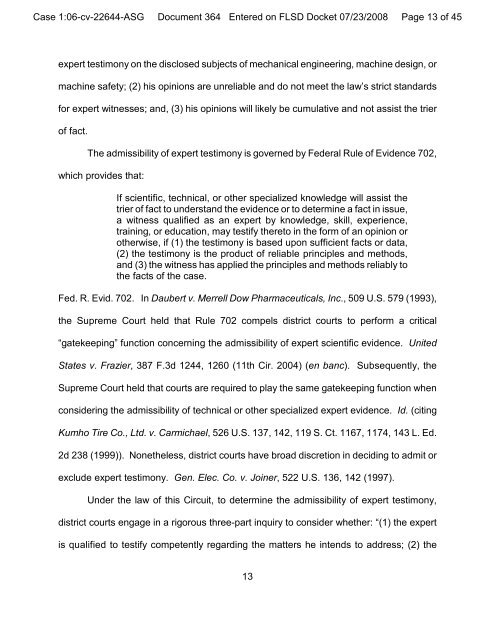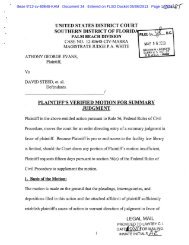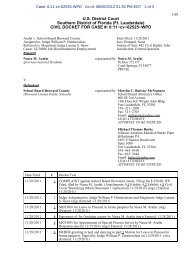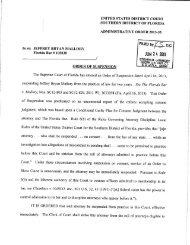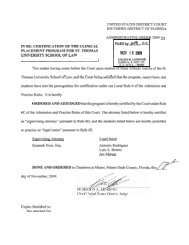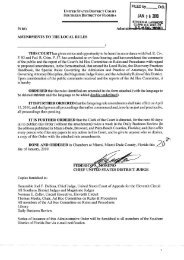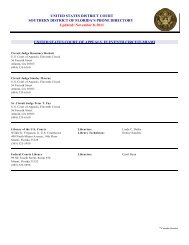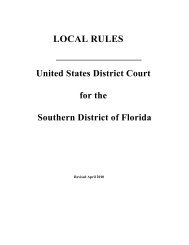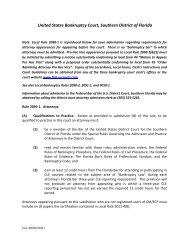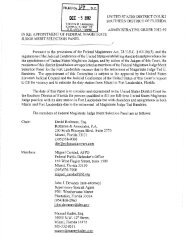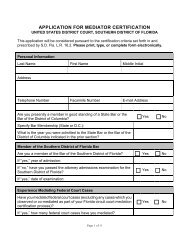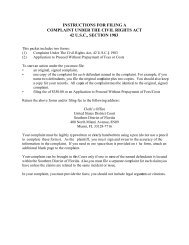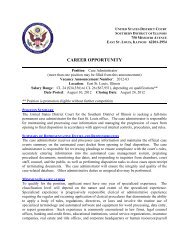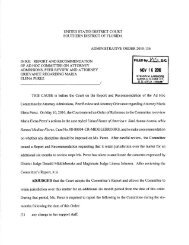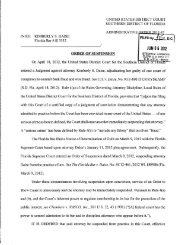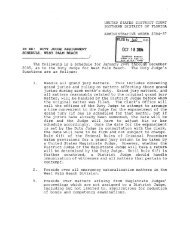Motion in Limine - United States District Court
Motion in Limine - United States District Court
Motion in Limine - United States District Court
You also want an ePaper? Increase the reach of your titles
YUMPU automatically turns print PDFs into web optimized ePapers that Google loves.
Case 1:06-cv-22644-ASG Document 364 Entered on FLSD Docket 07/23/2008 Page 13 of 45<br />
expert testimony on the disclosed subjects of mechanical eng<strong>in</strong>eer<strong>in</strong>g, mach<strong>in</strong>e design, or<br />
mach<strong>in</strong>e safety; (2) his op<strong>in</strong>ions are unreliable and do not meet the law’s strict standards<br />
for expert witnesses; and, (3) his op<strong>in</strong>ions will likely be cumulative and not assist the trier<br />
of fact.<br />
The admissibility of expert testimony is governed by Federal Rule of Evidence 702,<br />
which provides that:<br />
If scientific, technical, or other specialized knowledge will assist the<br />
trier of fact to understand the evidence or to determ<strong>in</strong>e a fact <strong>in</strong> issue,<br />
a witness qualified as an expert by knowledge, skill, experience,<br />
tra<strong>in</strong><strong>in</strong>g, or education, may testify thereto <strong>in</strong> the form of an op<strong>in</strong>ion or<br />
otherwise, if (1) the testimony is based upon sufficient facts or data,<br />
(2) the testimony is the product of reliable pr<strong>in</strong>ciples and methods,<br />
and (3) the witness has applied the pr<strong>in</strong>ciples and methods reliably to<br />
the facts of the case.<br />
Fed. R. Evid. 702. In Daubert v. Merrell Dow Pharmaceuticals, Inc., 509 U.S. 579 (1993),<br />
the Supreme <strong>Court</strong> held that Rule 702 compels district courts to perform a critical<br />
“gatekeep<strong>in</strong>g” function concern<strong>in</strong>g the admissibility of expert scientific evidence. <strong>United</strong><br />
<strong>States</strong> v. Frazier, 387 F.3d 1244, 1260 (11th Cir. 2004) (en banc). Subsequently, the<br />
Supreme <strong>Court</strong> held that courts are required to play the same gatekeep<strong>in</strong>g function when<br />
consider<strong>in</strong>g the admissibility of technical or other specialized expert evidence. Id. (cit<strong>in</strong>g<br />
Kumho Tire Co., Ltd. v. Carmichael, 526 U.S. 137, 142, 119 S. Ct. 1167, 1174, 143 L. Ed.<br />
2d 238 (1999)). Nonetheless, district courts have broad discretion <strong>in</strong> decid<strong>in</strong>g to admit or<br />
exclude expert testimony. Gen. Elec. Co. v. Jo<strong>in</strong>er, 522 U.S. 136, 142 (1997).<br />
Under the law of this Circuit, to determ<strong>in</strong>e the admissibility of expert testimony,<br />
district courts engage <strong>in</strong> a rigorous three-part <strong>in</strong>quiry to consider whether: “(1) the expert<br />
is qualified to testify competently regard<strong>in</strong>g the matters he <strong>in</strong>tends to address; (2) the<br />
13


